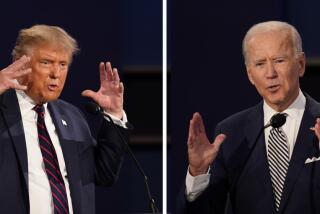A lot riding on Romney’s ‘Veepstakes’
With Mitt Romney all but officially anointed the Republican presidential nominee, the national political narrative now turns to the “Veepstakes”: who Romney will choose for his running mate. From a policy point of view, this is arguably the most important decision Romney will make in his presidential race.
The importance of the vice president is not for electoral reasons — even the most disastrous choices have been found to have a negligible impact on the electorates’ voting decision. Instead, as recent history shows, the top of the ticket is both choosing a crucial member of his policy team and naming his potential successor for the party’s nomination.
These are changes from the historical norm. From 1836 until 1960, when Richard Nixon broke the streak, only vice presidents who moved up due to the death of a president were able to later claim their party’s nomination for the presidency. However, counting Nixon, seven of the last 11 vice presidents have done so. All but the disgraced Spiro Agnew, the deceased and unelected Nelson Rockefeller, the ridiculed Dan Quayle and the health-plagued Dick Cheney went on to be their party’s standard-bearer. It may not look that great for Joe Biden — primarily because of his age, as he would be the oldest president elected if he runs in 2016 — but he can’t be ruled out.
COMMENTARY AND ANALYSIS: Presidential Election 2012There are several factors that explain the rise of the vice president to the role of heir apparent. Probably the most important is the downfall of the political convention and the rise of the primary system as the method for selecting presidents. Previously, state leaders and machine bosses played the major role in selecting presidents. The vice presidential choice was a bargaining chip and an obvious sop to the losing team. The vast majority of these consolation prizes were handed out to men who were rarely prominent or powerful individuals.
But now, voters select presidential candidates in the primaries. Without the need to bargain hard, if at all, for convention votes, the candidate personally chooses the running mate. The choice is not designed to mollify a disgruntled faction but rather to improve the ticket’s chances of success in November. Hence, most of the recent VP candidates (with a few glaring exceptions) have been prominent political figures. In fact, every first-choice Democratic vice presidential nominee since 1940, with the exception of Rep. Geraldine Ferraro, was a sitting U.S. senator.
This has resulted in much higher name recognition for vice presidents, which helps with getting voter support, fundraising and forming a nationwide political organization.
Additionally, presidents are in a way supporting the vice president’s future bid for the top job. Vice presidential succession can be seen as the equivalent of voter ratification of a presidential term. On the other side of the coin, the vice presidential candidate on a losing ticket rarely gets a boost for their own presidential bid later. Only three went on to win a presidential nomination, and one, Walter Mondale, was actually a vice president.
There are other reasons that the choice of a vice president is particularly important today. Vice presidents have increasingly become players in politics and governing. Cheney was the most noteworthy example, and Biden also seems to be a prominent administration player. In fact, this is a relatively recent trend. For much of its history, the position was seen as “not worth a bucket of warm spit” — in the cleaned-up gibe of FDR’s first vice president, John Nance Garner.
However, starting with Harry Truman’s decision to make the vice president a member of the National Security Council, presidents have added to their running mate’s portfolio, giving them key political and policy roles. Since then, the vice president’s office has only grown in power.
In that vein, the vice president is one of the only executive officials in the administration whom the president cannot get rid of during an initial term. Presidents can fire the entire Cabinet, replace all the generals, divorce a spouse and disown a child, but they have no power to act against the vice president. It is a choice that presidents have to live with — and sometimes, live down.
In the current race, prominent Republican names are getting a lot of media attention. They are mainly from key swing states and include Ohio Sen. Rob Portman, New Jersey Gov. Chris Christie, Virginia Gov. Bob McDonnell and Florida Sen. Marco Rubio (despite his many protestations that he’s not interested).
Pundits will carefully examine the candidates for political benefits and drawbacks, focusing on whether the running mate can help pick off a swing state and what momentum boost he or she can provide to the ticket. Historically, Republican candidates have not focused on that, instead basing the selection on two more subtle factors. One is that the running mate can serve as an effective attack dog who will strongly criticize the opposing ticket. The other is that the choice be someone who will bridge an intra-party divide — whether it is ideological, like Ronald Reagan and George H.W. Bush; generational, like John McCain and Sarah Palin; or experience, likeGeorge W. Bush and Dick Cheney.
Few will mention that the only vice presidential choice in modern history believed to have made an electoral difference was Lyndon Johnson more than half a century ago. Even fewer will mention the fact that the Republican presidential candidates haven’t chosen a VP candidate from a swing state in at least 50 years.
Romney’s pick will be gone over with a fine-tooth comb for these electoral benefits. But voters should treat this choice as more than some overblown and temporary strategy. If Romney is elected, the choice of the vice president is the single campaign move most likely to shape both his and the next presidency.
Joshua Spivak is a senior fellow at the Hugh L. Carey Institute for Government Reform at Wagner College. He writes for the Recall Elections blog.
More to Read
A cure for the common opinion
Get thought-provoking perspectives with our weekly newsletter.
You may occasionally receive promotional content from the Los Angeles Times.






